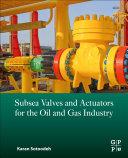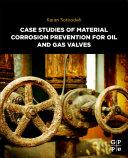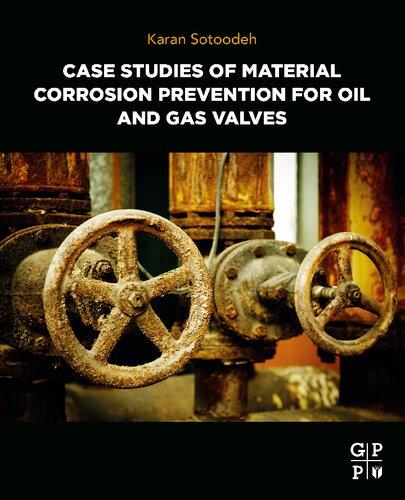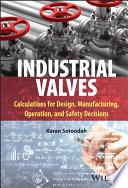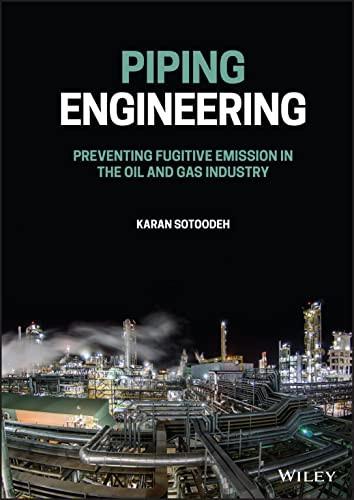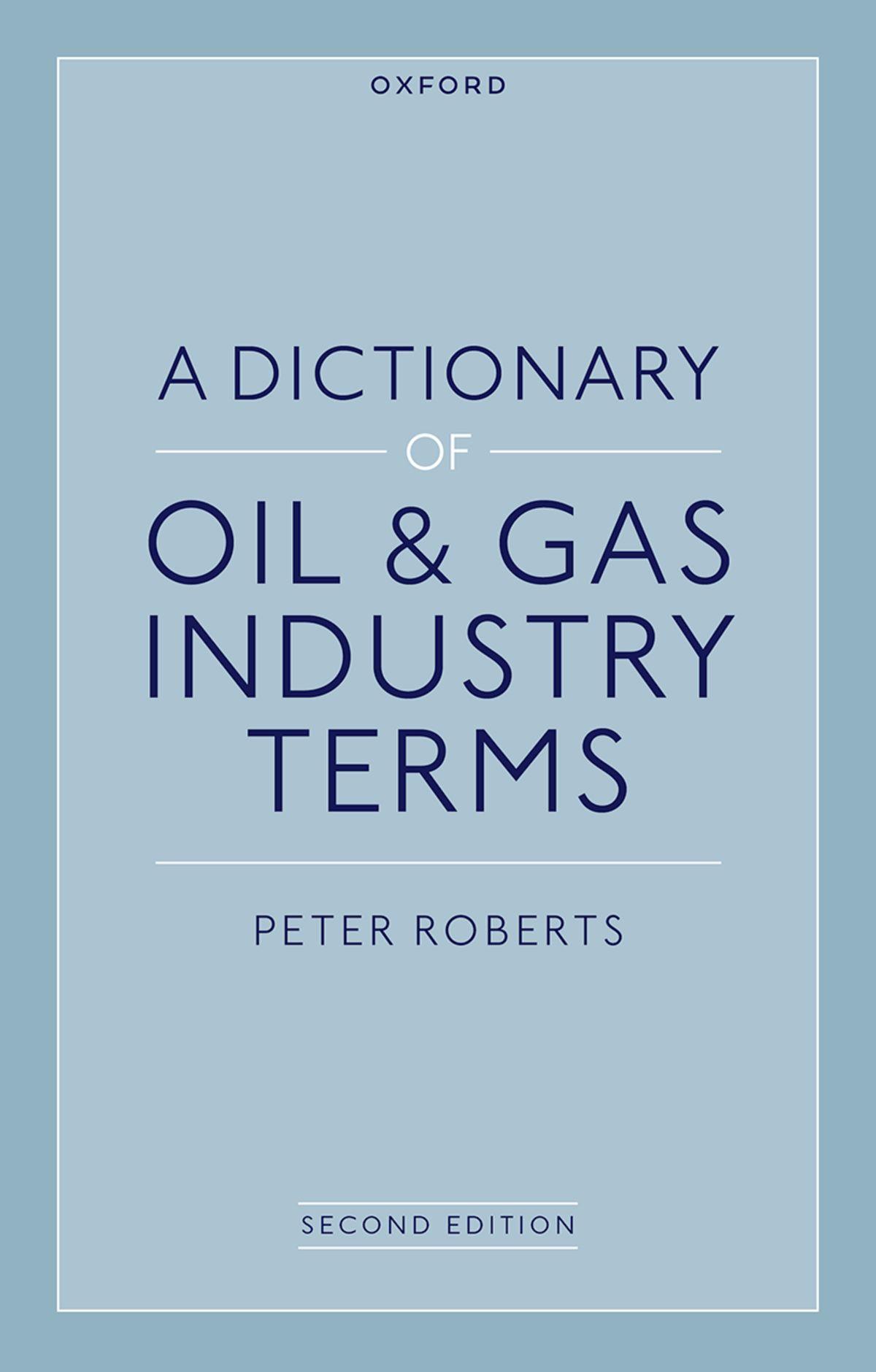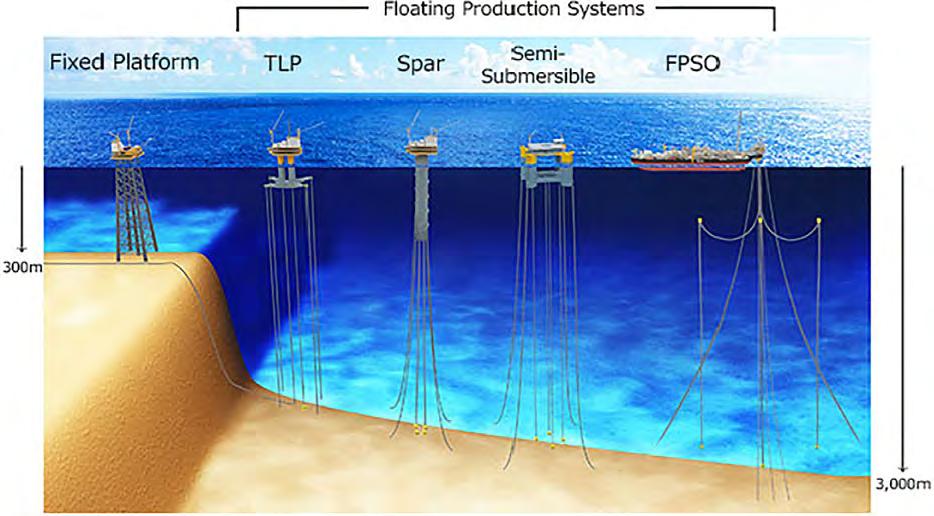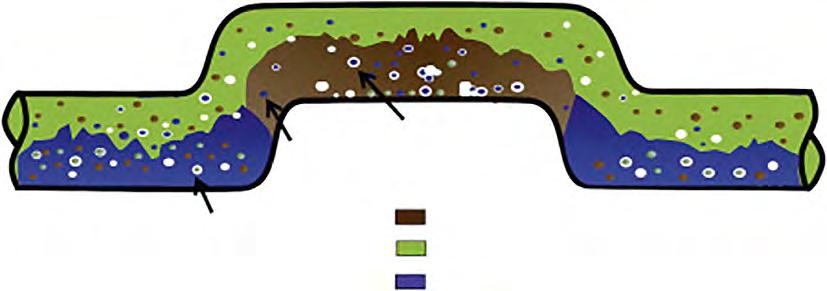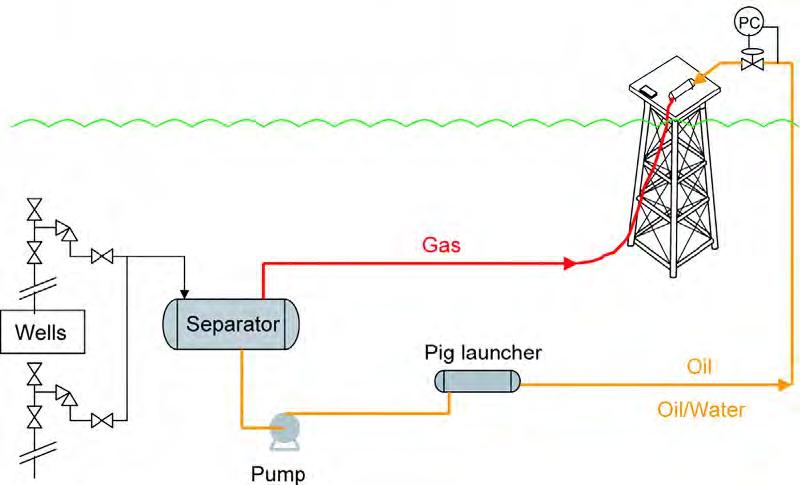Introductiontothesubseasector oftheoilandgasindustry
1.1Introductionandhistory
Theterm“subsea”insimplelanguagereferstounderwaterlocationssuchasseas andoceanswhichareknownasasectoroftheoffshoreoilandgasindustry.Manyoiland gasresourcesarelocatedunderthewaterinoffshoreareasaroundtheworld.Americans begantheexplorationforoilandgasinthePacificOceanmorethan70yearsago.Infact, nocompanytooktherisktodrilloutsidethebordersofthelandbefore1947.Theoffshoreoilandgasindustrystartedin1947whenthefirstoilwellwascompletedbyKerrMcGeeinjust4.6mofwaterintheGulfofMexico.Atthetime,almosteveryone believedthattherewasnooilintheGulforMexicoandthatdrillingintheGulfwould leadonlytofindingsaltdomes.Littleequipmentandfewfacilitieswerespeciallydesigned atthattimeforoffshoreoilexploration,drilling,andproduction.Bytheendof1949, 11oilandnaturalgasfieldshadbeenfoundintheGulfofMexicowith44exploratory wellsestablishedaccordingtothereportoftheNationalOceanIndustriesAssociation. Theoffshoresectorofoilandgasexpandedafterwardandtheexplorationandproduction
ofoilandgasmovedtodeeperwaterdepths.In1961thefirstsubseawellwascompleted byShellcompany.Thefirstdiver-lesssubseacompletionwasperformedin1967.The firstNorthSeasubseadevelopmentprojectwasnamedEkofiskwhichwaslocatedata depthof220ft(approximately67m)ofthesea.Onehundredandfortyoperationalsubseawellsexistedworldwideby1978.ShellCoulombmadethedeepestsubseatiebackata depthof7300ft(approximately2225m)in2004.Bythen,thenumberofoperatingsubseawellshadreached2404worldwide.AjointventureofBritishPetroleumandExxon MobilstartedproductionoftheThunderHorsedeep-wateroilandgasfieldlocated 240kmoffthewestcoastofNewOrleansatadepthofapproximately1900m.The OrmenLangeprojectoperatedbyhydro,aNorwegiancompany,wasthelongesttieback atapproximately160km.
Nowadays,theventureofexplorationandproductionofoilandgasismovingto deep-waterdepthsbetween1and4km.Subseadevelopmentisgenerallydividedinto twocategories:shallowanddeep-waterdepths.Thereisnocleardefinitionofdeepwater but,ingeneral,depthsthatareoutofreachofadiverarecalleddeepwater.Basedonthis definition,depthsintherangeof300mandmorecanbeconsidereddeepmaybe 20yearsago.Thedefinitionofdeep-waterdevelopmentischangingnowsinceoilexplorationventureismovingmoreandmoretodeeperwaterdepths.Thereforethedefinition ofdeep-waterdepthcouldbechangednowtodepthsofmorethan1km.
Manyfixedplatformswereusedinthebeginningforthedevelopmentofoffshore fieldsinshallowwaterdepths.Fixedplatformsareattachedtotheseafloorbylegsmade eitherfromsteelorconcretethatrelyontheirownweighttobefixedtothefloor.These platformscanbedesignedtobeusedforlong-term(30+years)oilandgasproductionand aresuitableforinstallationonthefieldatamaximumof300mdepthasillustratedin Fig. 1.1.Atension-legplatformTLPorextendedtensionlegplatformisafloatingstructure
Fig.1.1 Offshorefielddevelopment/productionsolutions. (Courtesy:MODEC/Springer.)
thatismoored(connectedtotheseabedbytendons).ATLPisasuitablefielddevelopmentplatformforwaterdepthsbetween300and1500m.Sparplatformsarefloating platformsusedfordeep-waterdepthsofmorethan1.5km;theseplatformsareanchored totheseabed.Therobustdesignofthesparplatformmakesthisoptionresistanttowind, waves,andcurrents.Asparplatformcontainsalargediameterverticalcylindersupporting adeckasillustratedin Fig.1.2.Semisubmersibleplatformsarebuoyantandcontainmultileggedfloatingstructureswithalargedeck.Offshoreplatformsaresteelstructureswith legsdirectlyconnectedtotheseafloorandareonlysuitableforthedevelopmentofa singleoilwell.
Astheoilfieldsgetdeeper,oilfielddevelopmentischangingandtheuseofshipscalled FloatingProductionStorageandOffloading(FPSO)vesselsisbecomingmorepopular. AnFPSOreceivestheproducedhydrocarbonfromthesubseaunitsandprocesses,stores, andfinallytransportsit.Unlikeajacketplatformwhichisconnectedtoasinglewell,a FPSOcanbeconnectedtoseveralwells.Infact,anFPSOmaybeusedbyoffshoreoiland gasoperatorcompaniesfordifferentpurposessuchastheproductionandprocessingof
Fig.1.2 Sparplatform. (Courtesy:OffshoreTechnology.)
petroleumandtostorethefinishedproducts. Fig.1.1 comparesdifferentfielddevelopmentsolutionsbasedonthedepthofthefield.
Themainaimofsubseadevelopmentistoselecttheoptimumwayintermsofsafety andeconomicalgaintoextracttheoilandgasfromsubseaoilfields.Subseadevelopment iscomprisedofdifferentactivitiessuchasexploration,drilling,completion,andproduction.Subseatechnologyisdesignedtomeetveryspecialanduniquechallengesandthus requiresspecializedengineeringtasks.
Theconceptofsubseaoilfielddevelopmentwasimplementedintheearly1970sby installingsubseawellheads,Christmastrees,productioncomponents,andfacilitiessuchas manifolds,jumpers,andpipelineontheseabed.Moredetailedinformationaboutsubsea productionsystemsisprovidedinthenextsectionofthischapter.Thefollowingparametersshouldbetakenintoaccountforsubseadevelopment:
- Waterdepth:shallow,deep,orintermediate;
- Standaloneortieback:asubseatiebackisdefinedasanengineeringsolutionthatconnectsanewoilfieldtoanexistingproductionfieldandisapopulartrendinsubsea development;
- Verticalorhorizontaltreewhichaffectstheweightandfigureofthetree;
- Hydraulicandchemicalsupplyunits;
- Subseaprocessingequipmentandcomponents;
- Fielddevelopmentarchitectureorconfigurationtoprovideareliable,safe,andcosteffectivearrangement;
- Artificialliftmethod.
1.1.1Benefitsofsubseaengineering
Akeybenefitofsubseaprocessingisthatitimprovesoilandgasproductionandrecovery fromthereservoir.Theotheradvantageofsubseaprocessingisthatitsavescostand increaseseaseofproductionbysavingspaceonthetopsidefacilities,whetherplatform orFPSO,andreducesthetransferoflargevolumesofuntreatedhydrocarbonfromdeep subseadepthstothesurface.Asanexample,theseparationofthreephasesofoil,gas,and waterproducedfromthereservoircanbedonesubseawithoutanyneedtotransferallof thesephasesallthewaytothetopside.Inaddition,undesirableby-productsofoilandgas suchascarbondioxide(CO2)andhydrogensulfide(H2S)mayberemovedfromthereservoirfluid(typicallyoilandgas)ontheseafloorandthereisnorequirementtotransfer themtothetopsidefacilitiesthroughaflowline.Aflowline,alsocalledapipeline,is definedasasegmentofpipingthattransfersthefluidcomingoutfromthewellhead tothetopsidefacilitiesfromthemanifolds.Animportantpointisthataflowlineisconnectedtothetopsidefacilitiesindirectlythroughrisers(see Fig.1.3).Ariserisdefinedasa segmentofpipethatconnectsanFPSOoraplatformtoasubseasystemsuchasaflowline sothispipe(theriser)isextendedbetweentheseabedandthesurface.Thereforeboth

risersandflowlines(pipelines)arepartsofatransportationsystemtobringtheproduced hydrocarbontothetopsidefacilities.Riserstypicallyrangeinsizefrom300 to1200 indiameterandcanbeeitherflexibleorrigid.
Subseadevelopmentcansolvetheflowassuranceproblemstoalargeextent. Multiphaseflow,hydrate,andwaxformationareoperationalproblemsassociatedwith flowassuranceandpipingsystems.Multiphaseflowcanhavemanydifferentforms:one ofthemostsevereformsiscalledslugflow.Slugflowreferstoaconditioninwhichsubsea flowlineorrisersectionscompletelyfillupwithliquidandholdupthegasflow.Slugging hasmanydifferentadverseconsequencessuchashighloadsandpressuredropsinthepipingsystem,corrosion,anderosion.
Anotherformofflowproblemiscalledhydrate.Thisreferstosolidslikeicethatcan forminthenaturalgasathighpressureandlowtemperature.Formationofhydrateisvery likelytooccurduringthemultiphaseflowmovementofthethreephasesofoil,gas,and waterorthetwo-phaseoilandgasflowregime.However,hydratecanbeformedina single-phasegasafterseparationfromtheothertwophasesofwaterandoil.Thusagas dehydrationunitcouldbeusedontheplatformofanFPSOtoseparatethesaturated waterfromthegastopreventhydrateformationthroughtheinjectionofmethanolor glycolintothegasservice.Thereforeseparationofmultiphaseflowontheseafloor cansignificantlyreducetheriskofhydrateformationinthegasservice. Fig.1.4 illustrates hydrateformationinathree-phaseflowinanonstraightpipingsystem.
Crudeoilcancontainwaxorparaffinwaxesthatcanbecomedepositedinthepiping systemespeciallyatlowtemperatureandreducethepipingflowcapacityorblockthe piping.Injectionofawaxinhibitorintothehydrocarboninthesubseacanmitigate theriskofpipingblockageandflowreductionduetowaxaccumulation.Thusitcan beconcludedthatsubseadevelopmentandprocessingcanreduceflowassuranceproblemstoalargeextent.Thereforesubseadevelopmentcanalterthestrategyforthedevelopmentofmarginalfields.Marginalfieldsrefertofieldsthatarenoteconomicalto
Fig.1.3 Flowlineandrisertransportationsystem.
developandproducesincetheycannotprovideacceptablerevenue.Manyfieldsonce consideredmarginalcannowbeconsideredeconomicalduetosubseadevelopment.
Fig.1.5 illustratesasubseaseparationtechnologythatleadstotheseparationofoil, gas,andwaterorjusttwophasesofoilandgas.Subsea-producedoilandgasaretransportedtothetopsideplatformseparatelythroughoilandgasflowlines.
Themainchallengesindesigningasubseasystemarethatofdealingwithhighpressureanddeepwater.Inconclusion,thebenefitsofsubseadevelopmentandengineering aresummarizedasfollows:
- Subseaengineeringandprocessingmayeliminatetheneedforhavingaplatformora ship;
- Ifaplatformorshipisrequired,alessexpensiveonemaybeused;
Fig.1.4 Hydrateformationinthree-phasefluidinanonstraightpiping. (Courtesy:Elsevier.)
Fig.1.5 Subseaseparationandtransportation. (Courtesy:Springer.)
- Oilandgasfieldsdiscoveredindeeperandmoreremoteareasaremoreeconomicalto developandproduce;
- Theoilrecoveryfactorandproductionratecanbeincreased;
- Flowassuranceimprovement;
- Potentialcostsavingandimprovementofprojecteconomicaspects.
1.2Subseaproductionsystems
Subseaproductionsystemsarelocatedontheseafloorratherthanonthesurface. Asubseaproductionsystemcontainsthewholeprocessandallthefacilitiesusedfordrilling,wellcompletion,fielddevelopment,andproduction.Atypicalsubseaproduction systemincludessubseacompletedwells,subseawellheadsandproductiontrees,subsea manifolds,subseatie-instoconnectthepipingtoanotherpipingsystemorafacility includingpipelineendsandinlinestructures,aflowlineandsubseaequipmentsuchas aboostingpump,compressors,achemicalandhydraulicinjectionsystem,anumbilical andaproductioncontrolsystem. Fig.1.6 illustratesatypicalsubseaproductionsystem.
Someofthesubseaproductioncomponentscanbecategorizedas“subseaprocessing” components.Processingreferstothetreatmentoftheproducedfluidfromthereservoir. Apetroleumreservoiroroilandgasreservoirisasubsurfacepoolofhydrocarbonscontainedinporousorfracturedrockformations.Subseaprocessinginvolvesdifferent
Fig.1.6 Typicalsubseaproductionsystem. (Courtesy:Elsevier.)
activitiessuchasseparation,pumping,compression,filtering,etc.whichareexplained laterinthischapter.
Someofthemainsubseaproductioncomponentsandstructuresarehighlightedin Fig.1.7.Duetothehighpressureandsometimeshightemperature,aswellastheharsh subseaenvironmentandtheexternalpressurefromtheseawatercolumn,subseacomponentsandequipmentareexposedtohigh,complex,andcriticalloadcases.
1.2.1WellheadandChristmastrees
Awellheadtransferstheloadsfromthecasinginthewellandfromthecompletedwellto theseabed.Italsoprovidesapressurebarrierandaccesstothewellboreandproduction tubing.Asubseawellheadprovidesstructuralandpressureintegrityforthewellcasing andtubing.Inshort,asubseawellheadcansupportcasing,atubinghanger,aproduction tree,andotherdrillingandcompletioncomponents.Subseawellheadsaredesignedbased onAPI17D/ISO13628-4standardsrequirements.Differentconsiderationsshouldbe consideredforwellheadselectionanddesignsuchastheloadstransferredbythetubing hanger,annularinjectionrequirementssuchasgasliftorwaterinjection,specialmaterial selectionforsubseawellheadsandinstrumentation.Definitionsforthecasingandtubing hangerwillbeprovidedlaterinthischapter.
Asubseawellincludesdownholewellcompletioncomponentsaswellassubseatrees. Wellcompletionreferstoaprocessofmakingawellreadyforproductionandinjection intothewellafterdrilling.Infact,adrilledwellshouldbeclosedwithapiping,fitting, andvalveassemblyknownasaChristmastree(see Fig.1.8)togatherthereservoirfluid fromthewellheadanddirecttheproducedhydrocarbontotheproductionfacilities.
Fig.1.7 Subseaproductioncomponentsandstructures. (Courtesy:Springer.)
Another random document with no related content on Scribd:
they could neither sit nor lie, and where decency and humanity were at once violated. An instance of the summary mode in which Dalziel exercised his authority will show, better than any general description, the miseries of military rule. David Findlay at Newmilns, a plain country man, who had accidentally been at Lanark when the covenanters were there, but had not joined, was brought before him; and, because he either would not, or could not, name any of the rich Whigs who were with the army, he was instantly ordered, without further ceremony, to be shot. When the poor man was carried out to die, neither he nor the lieutenant who was to superintend the execution, could believe that the General was in earnest, but the soldiers told him their orders were positive. He then earnestly entreated only for one night’s delay, that he might prepare for eternity; and the officer went to Dalziel to request this short respite, when the ruffian threatened him for his contumacy, and told him that “he would teach him to obey without scruple.” In consequence, there was no further delay; Findlay was shot, stripped, and his naked body left upon the spot.
Nor were the inferior officers unworthy of their commander. Sir Mungo Murray having heard that two cottar tenants had lodged for a night two of the men who had escaped from Pentland, bound them together with cords, and then suspending them by their arms from a tree, went to bed, and left them to hang for the night in this torture, which, in all probability, would have finished them before morning, had not some of the soldiers, more merciful than he, relieved them from their painful situation at their own peril. Sir William Bannantyne, in Galloway, caused even the removal of Turner to be regretted. He took possession of Earlston House, which he garrisoned, and thence sent out his parties who plundered indiscriminately the suspected and those who had given no cause for suspicion, whose only crime was their property. Some, who could not purchase forbearance, they stripped almost naked—then thrust them into the most abominable holes in the garrison, where they were kept till nearly dead, before they were suffered to depart; and one woman, whom they alleged to have been accessary to her
husband’s escape, they tortured, by burning matches between her fingers with such protracted cruelty, that she fevered, and shortly after died; and so great was the universal consternation produced in these quarters among the conscientious Presbyterians, that such as could get out of the country, fled to foreign parts; and those who remained, lurked during a severe winter, in caves, pits, or remote unfrequented places of the land.
The arrival of a Dutch fleet in the Frith of Forth (April) relieved the afflicted west a little. This squadron, which had threatened Leith, and fired a few shots at Burntisland, occasioned the collecting of the whole troops in Scotland to defend the east, while the success that attended an attack upon the shipping in the Thames, obliged the government to suspend their crusades against the Presbyterian heretics, in order to guard their coasts from foreign insult. At the same time, the exasperation of the English, on account of their national disgrace, enabled the king to get rid of Lord Clarendon, a troublesome minister, whose habits of business, and ideas of economy, ill suited the beloved indolence and unmeaning, and worse than useless, profusion of his master, and whose regard for the decencies of life were opposed to the utter shamelessness of his profligate court.
But though relieved, in some measure, from military execution, the property of the Presbyterians was reached by a more base and cowardly mode of rapine. Heretofore, in cases of treason, the estates of rebels could not be confiscated, as the rebels themselves could not be tried in absence; and so express was the law on this subject that, in a former reign, it was deemed necessary to bring the mouldering bones of a traitor from his grave, and produce them in court, before he could be legally forfeited. The Lord Advocate, however, judged it proper to procure the authority of the court, previously to proceeding in opposition both to the statutes and common practice; and, therefore, proposed to the judges the following query—“Whether or not a person guilty of high treason might be pursued before the justices, albeit they be absent and contumacious, so that the justices, upon citation and sufficient
probation and evidence, might pronounce sentence and doom of forfeiture, if the dittay be proven?” The lords answered in the affirmative, and established a precedent, which was afterwards improved, for forwarding the severe measures of a party already sufficiently disposed to disregard all the ordinary forms of justice. All the gentlemen of property who had gone into exile, were in consequence forfeited, and their estates divided between the rulers and their friends.
Continual dissensions among the Scottish politicians had been the bane of Scotland almost ever since the nation existed. At this period they proved of some small service, by diverting, for a short space, the attention of the persecutors to their own personal affairs. Sharpe, by his duplicity, had incurred the displeasure of the king; and a strong party in the Scottish council, consisting of the military officers and a majority of the prelates, were opposed to Lauderdale, whom they still suspected of being too much attached to his old friends, and envied for enjoying so much of the favour of the king. This party, to secure their ascendancy, proposed to continue and increase the standing army, and to enforce the declaration, under pains of forfeiture, upon all the Presbyterians, fanatics, or Whigs, whom it was necessary to extirpate as incorrigible rebels, whose principles were hostile to all good government, and LieutenantGeneral Drummond, with Burnet, archbishop of Glasgow, had been sent to London to procure the king’s concurrence.
A convention of estates, held at Edinburgh in the month of January in order to further these objects, voted a cess of sixty-four thousand pounds a month, and, besides, offered to maintain all the forces the king should think proper to raise.[60] Lauderdale instantly perceived that this would give his enemies an overwhelming power in Scotland, by throwing into their hands the disposal of the forfeitures and the army commissions, and he obtained from the king a letter which, although it authorized very arbitrary proceedings, yet effectually counteracted the scheme of his opponents. It empowered them to tender the oath of allegiance and declaration, and to incarcerate in case of refusal: it authorized
disarming the gentlemen in the disaffected shires—seizing all serviceable horses in possession of suspected persons—ordered the militia to be modelled—arms and ammunition to be provided—the legal parish ministers to be protected from violence—and all engaged in the late rebellion, to be criminally pursued without further delay. Proclamations were in consequence issued for again disarming the west and seizing the horses; and no person in future, who did not regularly attend his parish church, was to be allowed to keep a horse above one hundred merks value; but as nothing had been said by his majesty about forfeitures, the declaration was little heard of, and the leading men being changed shortly after, the afflicted country obtained a brief glimpse of repose.
60. A convention of estates differed from a parliament, in being convened for one specific purpose, commonly like those for raising money.
Lest, however, it might be supposed that any relaxation was meant to be shown in supporting prelacy, a letter was transmitted from court, early in May, expressing the royal determination not only to encourage and protect the bishops in the exercise of their callings, and all the orthodox clergy under them, but also to discountenance all, of what quality soever, who should show any disrespect or disaffection to that order or government; and earnestly recommending to those in power, to give the utmost countenance to the orthodox clergy, and to punish severely any affronts put upon them, “to the end,” it is added, “that they may be the more endeared to their people, when they see how careful we, and all in authority under us, are of their protection in the due exercise of their calling.” The council in consequence issued a proclamation, rendering heritors and parishioners liable for all the damages that might be done to their ministers, which, in the sequel, was most rigorously enforced, although it had certainly little tendency or effect in producing any sentiments of endearment in the breasts of the people towards pastors who required such eminent exertions of royal and magisterial care.
Not long after, Sir Robert Murray, distinguished for his love of science and his moderation of temper, was sent down to Scotland to procure, if possible, an accurate account of the state of the country. He was at this time high in the confidence of Lauderdale, whose interest he assiduously promoted, and whose party he essentially strengthened by the mighty accession of character he brought them. The bishops and their party were extremely anxious to have, above all things, the army continued, and used every method to induce Sir Robert Murray to coincide with them in opinion. Burnet, archbishop of Glasgow, protested that, if the army were disbanded, the gospel would depart out of his diocese; and the Duke of Hamilton said he did not think his life would be secure even in following his sport in the west; when Tweeddale, with many professions of care for his Grace’s life, proposed a squadron of the life-guard might be sent to quarter on his premises—a mode of protection with which the Duke did not appear very highly enraptured. But their guardian, Hyde, was in disgrace—an unfavourable peace had terminated an unsuccessful Dutch war and a show of temporary moderation, at least, was required by the circumstances of the nation. Peremptory orders were therefore sent to Scotland to disband the whole army, except two troops of horse and one (Linlithgow’s) regiment of foot guards, which was accordingly done to the great joy of the country, but much to the distress of many idlers who had lately bought their commissions for the purposes of plunder, and considered a captaincy equal to an estate, although numbers, especially of the higher ranks, had their losses more than compensated by their shares of the forfeited estates.
Lauderdale was too good a politician to allow the present humiliation of his opponents to pass unimproved. The indolence and dissipation of Rothes had laid him open to the charges of inattention and neglect of duty during the Dutch visit. He was therefore, as an honourable dismissal, made Lord Chancellor preparatory to losing the Commissionership. The Earl of Tweeddale’s eldest son, Lord Yester, having been married to Lauderdale’s only daughter and presumptive heiress, his father was named one of the commissioners
of the treasury along with Kincardine and Sir Robert Murray, who had also been appointed Lord Justice-Clerk; and his party in the privy council had been still further augmented by the admission of the Earl of Airly, Lord Cochrane, and others. The first trial of strength between the factions, was upon the important question, how the peace of the country was to be secured when the army was disbanded? As the same vile and mischievous system of forcing a hated hierarchy upon the people was determined to be persisted in, the prelates and military were for pressing the declaration according to the king’s letter; for although they had now no immediate prospect of touching the money, yet they always had a kind of natural propensity to urge the harshest measures, and those which would promote, rather than appease, the troubles of the land. The Lauderdale party proposed a general pardon and a bond of peace, so moderate in its terms, as that it would be either cheerfully taken, or render those who refused it inexcusable. The contest was long and hotly maintained; and when the council divided, their clerk, Sir Peter Wedderburn, affirmed that the declaration was carried; this, Sir Robert Murray denied, and the vote was again put, and again the clerk affirmed a majority was for the declaration; Sir Robert still contended that this was not the case, and the Chancellor warmly asking, if he doubted the clerk’s fidelity? Sir Robert replied he would trust the evidences of his own senses before any clerk in the world, and insisted that the names should be distinctly called, and the votes accurately marked; when it plainly appeared that a majority was for the bond, which, but for his firmness, by an impudent shameless falsehood would have inevitably been lost.
Pursuant to these resolutions, a pardon was proclaimed; but the exceptions were so numerous that it was of no avail to any person who possessed either influence or property, and it was remarked that already more than half the number of those who had been at Pentland, were either executed or forfeited; and those who were pardoned, were only the persons whom from their obscurity it would have been impossible to discover, or from their poverty, fruitless to forfeit. The bond was short, and ran thus:—“I, A. B., do bind and
oblige me to keep the public peace, and not to rise in arms without the king’s authority, and that if I fail I shall pay a year’s rent: likewise, that my tenants and men-servants shall keep the public peace; and in case they fail, I oblige myself to pay for every tenant his year’s rent, and for every servant his year’s fee. And for more security, I am content thir presents be registrate in the books of council.” Excepting, perhaps, the hardship of obliging a landlord to bind himself for his tenant and servant, there does not appear, at first sight, any thing objectionable in this obligation. But the government had entirely lost the confidence of the upright Presbyterians by their uniform endeavours to ensnare their consciences with oaths and obligations, conceived in general terms, to which a double meaning was attached; and which, when any dispute arose, they insisted should always be understood according to the sense the administrators of the oath imposed upon it. Now this bond was constructed in the usual manner, and the expressions —“keep the public peace, and not rising in arms”—were the ambiguous phrases; and numbers refused to sign, unless allowed to explain that by these expressions they were not to be understood as binding themselves to support the prelatical religion, to attend their churches, and desert the preaching of the gospel by their own ministers, or acknowledge the doctrine of passive obedience. Many pamphlets were printed, and much discussion took place upon the subject; but the bond being soon laid aside, the controversy became unimportant, except in so far as succeeding events plainly showed that the objections to the bond were not unmeaning scruples, and that those who refused to sign, acted from a complete knowledge of the persons with whom they were dealing, who would allow of no interpretation inconsistent with entire, implicit, unconditional submission. The proclamation for disarming the west was also in part recalled, and orders issued for restraining the irregularities of such soldiers as were kept in pay—a number of gentlemen who had been imprisoned in 1665 were liberated—and the year closed with the illusive prospect of a deceitful calm.[61]
61. In December, “Naphtali, or the Wrestlings of the Church of Scotland,” written by Sir James Stuart of Goodtrees, and Mr James Stirling, minister of Paisley, was ordered to be burned by the hands of the hangman, and all who had copies of it after that date to be severely fined a very foolish but not uncommon mode of publicly confessing that a book is unanswerable. Honeyman, bishop of Orkney, attempted to answer it, which produced an able reply by Sir James “Jus populi vindicatum.”
[1668.] Great expectations were entertained that some legal protection might be again enjoyed by the harassed Presbyterians, as during last year a commission had arrived from the king to bring Sir James Turner to trial for his tyranny and oppression in the south. But it soon appeared that whatever might have caused the act of justice, it was no sympathy for the sufferings of the “Fanatics.” The extortions, harassings, imprisonments, and other charges against Sir James, were easily established; but it did not appear that he had either acted without or beyond his instructions, or appropriated much of the spoil for himself, and he was only dismissed the service, while those he had robbed received no compensation. Sir William Bannantyne’s trial followed. The accusations against him were more atrocious, torturing and rape being offered to be proved in addition to plunder and rapine. But, perhaps, what was his most indefensible crime, he could not account for the monies he had received. He was therefore banished and fined in two hundred pounds sterling—a gentle sentence for such conduct.[62] Little real relief was however afforded to Presbyterians, whose principles would not bend to the times, or to those who, at the risk of reputation, property, liberty, or life itself, refused to abstain from preaching the gospel to their fellow-sinners, or those who would not consent to forsake the worship of God, or leave his ordinances dispensed by his ministers— to attend on a profanation of all sacred service by hirelings who were—(scarcely even the disguised)—enemies of the cross of Christ. In proportion as lenity was exercised to others, so much the more was hatred evinced towards ministers and those who frequented conventicles.
62. He went afterwards to the low country, and was killed by a cannon-ball at the siege of Grave, which drove his heart out of his body—a mode of death
he had been accustomed to imprecate upon himself.
Hitherto there had been but few field-meetings, yet preaching and exhortation in private houses, barns, and other convenient places, had been very common and well attended; and, from the concurring testimony of all who were accustomed to frequent them, who have left any record, the Spirit of God seems in an eminent manner to have blessed these calumniated, despised, and persecuted assemblies.[63] In a letter from the king, January 16, which settles the meaning of “the public peace,” these meetings, which were peculiarly obnoxious to the bishops and curates, are thus pointed out to the notice of the council:—“We most especially recommend to you to use all possible means and endeavours for preserving the public peace under our authority, and with special care to countenance and maintain Episcopal government, which in all the kingdom we will most inviolably protect and defend. You must by all means restrain the gatherings of the people to conventicles, which are indeed rendezvouses ofrebellion, and execute the laws severely against the ringleaders of such faction and schism.” The council, with prompt obedience, appointed any of their number to grant warrants for seizing and haling to prison all “outted” ministers or others who should keep unlawful convocations; and the Earl of Linlithgow, commander of the few forces, was directed to distribute them over the country in such manner as might be calculated most easily to dissipate these illicit concerns. A company of foot was, in consequence, ordered to lie at Dumfries; another, with fifteen horse, at Strathaven, in Clydesdale; forty troopers at Kilsyth; two companies and fifteen horse at Glasgow; one company at Dalmellington; and a last at Cumnock, in Ayrshire.
63. Memoir of Fraser of Brae, p. 126-7.
To stimulate their exertions, and still farther “to endear” his beloved prelates to the lieges, the king, on the 25th July, requires them to rid the kingdom of all seditious preachers or pretended ministers who had kept conventicles or gathered people to the fields since January last; “for we look on such,” he adds, “as the great
disturbers of the peace and perverters of the people.” And the council urged their officers to be upon the alert; even Tweeddale, who was generally supposed friendly to the Presbyterians, or at least moderate, was not less anxious than his associates to prevent or extinguish the light of the gospel which from these conventicles was spreading over the country. In writing to the Earl of Linlithgow, he says—“Your lordship knows the counsel’s desing reachith furder then to make them peaceable when the rod is over their head, which I beleive your lordship will follow as far as possible; for, iff ther be not som of thes turbulent peopel catched, all is in vayn: when they are chassed out of one place, they will flie to another: for God’s sake, therefor, endeavour by all means possible to learn wher they haunt and whither they are gon;” and then he advises the commander colonel-commandant to send parties “to catch them wher they can be had, wer it 100 mils off, especially Mr Michael Bruce.”
Michael Bruce, thus denounced, was of the family of Airth, so highly and deservedly esteemed in the annals of the Reformation, himself “a worthy, useful, and affectionate preacher.” He had been driven from Ireland, where he had been settled, and was now zealously and boldly preaching in Stirlingshire to large auditories, generally in houses, but occasionally in the fields, and had “presumed also to baptize and administrate the sacraments without any lawful warrant,” he was therefore pursued by the soldiers as a wild beast, and at last surprised, wounded, and taken prisoner. After his wounds would allow of his being moved, he was brought to Edinburgh and sentenced to banishment, but, on his being sent to London, his sentence was altered, and he was ordered to be carried to Tangiers in Africa. He, however, obtained the favour of being permitted to retire secretly to Ireland. Several of the other “outted” ministers were likewise ordered to prison, and some fined for similar misdemeanours; numbers, however, in Fife, in the north, and even in Edinburgh,[64] laboured with much success, while “Mr Blackadder and his accomplices” were not less assiduous in their visits to the west and in the south. Professions of greater indulgence to the Presbyterian ministers were, notwithstanding these proceedings,
held out to them by Tweeddale, who had had interviews and made proposals to several of the most eminent then under hiding, when an unfortunate circumstance put an end to all hope of favour for the present.
64. Kirkton, Welsh, Blackadder, Donald Cargil, and many others, at this time resided in the capital for months together, and secretly exercised their ministry.
James Mitchell, a preacher, who had been at Pentland, and was by name exempted from the indemnity, considering Sharpe the prime instigator of all the calamities his country had endured, and was enduring, as well as the author of his own exclusion from pardon, and having heard of his keeping up the king’s letter till the last six were executed at Edinburgh, determined to free the land from such a monster, whom he viewed in the light of an enemy whose life he had a right to take in self-defence, as well as in the service of his country.[65] In pursuance of this resolution, he waited for the primate, July 11th, at the head of Blackfriar’s Wynd, where his house was, on purpose to effect it; and having allowed him to be seated in his coach, deliberately walked up and fired at him, but Honeyman, bishop of Orkney, who was in the act of getting up, received the shot, by which his arm was shattered, and Sharpe, for the present, escaped. Mitchell, after firing, walked away coolly, and turning down Niddry’s Wynd, went thence to Stevenlaw’s Close, shifted his clothes, and returning to the High Street, without being discovered, mixed with the multitude who had collected, but who were giving themselves very little concern about the matter, when they heard that it was only a bishop that had been shot.
65. Vide Testimony, Naphtali.
Immediately the hue and cry was raised—the city gates were shut —the magistrates were ordered to make strict search after Whigs in the city or suburbs—the constables were called out, and a hundred soldiers sent to assist them. The town being considered a place where those who were proscribed could best conceal themselves, several of this description were then secretly residing there, and had
narrow escapes, none of the least remarkable of which was that of Maxwell of Monreith.
Being unacquainted with the town when the search began, he came running to Nicol Moffat, a stabler in the Horse Wynd, and begged him to conceal him, for he knew of no shelter. “Alas!” answered Nicol, “there is not a safe corner in my house.” But there was an empty meal-barrel that stood at the head of a table in his public room, and he added, if he chose to go in there, he would put something over and cover him. There was no alternative, and in Mr Maxwell went. Scarcely was he out of sight when a constable arrived, with a band of soldiers, and demanded if there were any Whigs there? “Ye may look an’ see,” replied Nicol carelessly, and the constable, deceived by his manner, proceeded no further; but, being thirsty, called for some ale for his party, and they sat down at the table. While drinking, they began talking about their fruitless search, when one said he knew there were many Whigs in town, and he did not doubt but there were some not far distant, to which another answered with an oath, knocking at the same time on the head of the barrel, “there may be one below this;” but they were restrained from lifting the lid; and when they had finished their potations, they went quietly away.
Others were not, however, so fortunate. The servant girl of a Mr Robert Gray, a merchant in Edinburgh and a godly man, having quarrelled with her mistress, out of revenge went to Sharpe, and told him that there they would find a receptacle of Whigs, and might discover the assassin, on which Mr Gray was brought before the council. Conjecturing what his servant might have told, he at once informed them that Major Learmont, Mr Welsh, and a Mrs Duncan, a minister’s widow, had dined with him not long before; but with regard to the assassin he knew nothing. The advocate then going up familiarly, after a short conversation, took the ring off his finger, telling him he had use for it, and dispatched a messenger of his own with it to Mrs Gray to tell her that her husband had discovered all, and sent this as a token that she might do the same. Deceived by this trick, worthy of the Inquisition, she acquainted them that Mr
Welsh sometimes lodged with Mrs Kelso, a rich widow, and preached in her house, and also where Mrs Duncan was to be found. Mrs Gray and her two female friends were immediately sent to prison, and soon after brought before the council, when Mrs Kelso was fined five thousand merks and banished to the plantations. Mrs Duncan also was sentenced to banishment, and only escaped torture by Rothes observing, “it was not customary for gentlewomen to wear boots.” After a long confinement, the sentence of banishment was relaxed; but Mr Gray felt so keenly, from having been the innocent cause of so much suffering, that he sickened, and died within a few days. Mr Gillon, the “outted” minister of Cavers, likewise met his death upon this occasion in a very inhuman manner. He had retired to Currie, a few miles from Edinburgh, for the benefit of his health, where, being apprehended about midnight by two or three rascally soldiers, who pretended to be searching for the bishop’s assassin, he was forced, in sport, to run before them a distance of nearly four miles to the West Port, where, after he arrived, he was kept standing for some hours in the open air before he could obtain admission, and then was sent to lodge in a cold jail. Next day, on being brought before the council, he was recognized and dismissed, but he did not survive the treatment he had received above forty-eight hours. During this year, to compensate for the loss of the regulars, the militia were modelled, properly officered, and prepared for service—a circumstance which, as it was a time of profound peace, might have created some misgivings respecting any alteration in the plans of government.
[1669.] Flattering themselves still with the returning favour of government, the ministers pursued their prohibited labours, and conventicles continued to increase, while the council, impelled on by the repeated injunctions of the king and solicitations of the prelates, not unfrequently forgot their professions of moderation, and proceeded to acts which might have dispelled the delusion. Conventicles found no mercy. The magistrates of burghs were now made responsible for any that might be held within their bounds; and early this year, the civic rulers of the capital were fined fifty
pounds sterling, because “Mr David Hume, late minister of Coldingham, took upon him to preach in the house of widow Paton on the last Sunday of February”—a circumstance, it is highly probable, the worthy provost and bailies had never heard of till they were summoned to pay for the exercise. An act of council immediately followed, prohibiting every person from having their children baptized by any other than the Episcopal clergy, under the penalty, to an heritor, of the fourth part of his valued rent a tenant £100 Scots and six weeks’ imprisonment—and a cottar twenty, and the same. To enforce this decree, the militia were to be employed in seizing the disobedient, and ordered to be supported by them, while on this service, at the rate of one shilling and sixpence sterling each man, and three shillings each officer per day; at the same time, collectors of fines were appointed to take care that the whole penalty was exacted; and among these, it is somewhat ludicrous to observe the Earl of Nithsdale, a papist, required to see a measure faithfully executed, the professed intention of which was, to prevent the growth of popery! then it seems lamentably on the increase—an increase the council had the effrontery to aver, was owing to the frequency of field-preaching.
The archbishop of Glasgow, whose jurisdiction was grievously annoyed by these pests, was peculiarly virulent in his opposition, prevailed upon Lord Cochrane (created Earl of Dundonald next year) to bring before a committee at Ayr, eleven ministers of that district who had been guilty of preaching and baptizing irregularly. Upon examination, the committee were inclined to dismiss them, but his lordship insisted upon their being sent to Edinburgh. There they were examined before a committee of the privy council, and acknowledged that they had allowed others, besides those of their own households, to attend when they worshipped God in their families and expounded the Scriptures, but none of them had been guilty of the enormity of field-preaching, and all promised to demean themselves peaceably, as they had hitherto done, and to give no just ground of offence. Their brethren, who were aware that temporizing would serve little purpose, were dissatisfied that they had not
asserted their indefeasible right as ministers of Christ to preach his gospel; and they appear to have been convinced that they had acted too faintly in his cause, for when they were called to receive sentence, Mr Fullarton, the “outted” minister of St Quivox, in name of the rest, addressed the Chancellor. After reminding him of the unshaken loyalty which the Presbyterian ministers had displayed towards his majesty in his lowest estate, and the unlooked for return they had met with, he added—“But now seeing we have received our ministry from Jesus Christ, and must one day give an account to our Master how we have performed the same, we dare have no hand in the least to unminister ourselves; yea, the word is like a fire in our bosoms seeking for vent; and seeing, under the force of a command from authority, we have hitherto ceased from the public exercise of our ministry, and are wearied with forbearing, we therefore humbly supplicate your lordship, that you would deal with the king’s majesty on our behalf, that at least the indulgence granted to others in our way within his dominions, may be granted to us.”
Then, after requesting to be delivered from the oppressive tyranny of their collector of the fines, a Mr Nathaniel Fyfe, whom Kirkton styles “a poor advocate, and alleyed to one of the bishops,” he concluded by telling him it would be no matter of regret when he entered eternity and stood before Christ’s tribunal, that he had acted as a repairer of breaches in his church. The council was crowded and very attentive, but the ministers were only excused for the time, and straitly charged in future to abstain from similar practices, on pain of being visited not only for any new, but likewise for their old transgressions; and the same day a proclamation was issued, strictly forbidding all conventicles, and rendering all the heritors in the western shires liable to a fine of fifty pounds sterling for every such meeting, on pretence of religious worship, as should be kept in any houses or lands pertaining to them.
How Mr Blackadder escaped, is astonishing, for during this year he seems to have been the most active of all the ministers, as well as the boldest. In the month of January, he preached publicly at Fenwick, and continued labouring in the west, till his over-exertions,
more suited to the earnest desires of the people than his bodily strength, produced an illness which confined him for several weeks. [66] When recovered (June) he went again to his “diocese,” round by Borrowstownness, where he established a congregation and secured to them the freedom of undisturbed worship, through the interest of his relation Major Hamilton, who was the Duke’s bailie of regality, and lived at Kinniel House. At the request of the Ladies Blantyre, Pollock, and Dundonald, he preached to large auditories, sometimes not fewer than two thousand. In Livingstone, he administered the Sacrament of the Lord’s Supper, and the example was followed in fifteen or sixteen adjacent parishes. The preaching of the gospel and dispensation of the ordinances were attended with such blessed effects that it was no wonder the enemy raged. Upon a humiliation day, in the muir of Livingstone, the four ministers who were to preach called aside several of the gravest and most sagacious men of the bounds, and inquired at them what were the most reproveable sins they observed as necessary to be confessed unto God in these bounds, and whereof the people were to be admonished that they might the better know how to carry on the following work of the day; the men, after a deliberate pause, answered, as to public scandals and every kind of profanity, they could not say much, for they had not heard of any outbreakings of fornication, adultery, or drunkenness, scarce these seven years past, in that parish or in several parishes about, since the public preaching of the gospel had broke up among them.
66. “Money frequently was offered him for bearing accidental expenses. Several gentlemen contributed sums, and collections were made in purpose, but he uniformly declined receiving any donation, ‘lest his ministry might bear the imputation of a covetous and mercenary spirit, or the enemy have occasion to reproach their cause as if money made them eager to preach.’” Crichton’s Mem. ofBlackadder, p. 148.
About the same time, Mr Hamilton the “outted” minister of Blantyre was apprehended and sent to Edinburgh to answer to the council for holding a conventicle in his own house in Glasgow. Being asked how many hearers were in use to attend his meeting? he
archly answered, that for these several years past the poor ministers of Christ who were forced from their flocks, could with difficulty support themselves and families, and could neither hire palaces nor castles. They might then easily judge what kind of houses they were able to rent, and whether they could hold large companies. His reply to whether others than his family were present? was equally pointed —“My lords, I have neither halberts nor guards to keep any out.”
One of the members who thought his sarcasms bore hard on the archbishop, reminded him of the favour he had got from his lordship, in being permitted to remain so long in Glasgow. “Not so much,” retorted the prisoner, “as Paul got from a heathen persecuting Emperor, for he dwelt two whole years in his own hired house, and received all that came in unto him, preaching the kingdom of God, and teaching those things that concern the Lord Jesus Christ with all confidence, no man forbidding him; but both the honest people of Glasgow and myself have been often threatened with violence if we did not forbear.” Finding themselves no match at this species of interrogation, the council demanded if he was willing to give bond to preach no more in that way. He replied, he had got his commission from Christ, and would not voluntarily restrict himself whatever he might be forced to do. “An’ where got you that commission?” asked the Chancellor. “In Matthew 28th chapter and 19th verse, Go teach and baptize.” “That is the apostles’ commission,” rejoined Rothes; “an’ do you set up for an apostle?” “No, my lord,” said Mr Hamilton, “nor for any extraordinary person either, but that place contains the commission of ordinary ministers as well as of extraordinary ambassadors.” When again asked, if he would give assurance that he would neither preach nor exercise worship anywhere but in his own house, he repeated his refusal, and was sent to prison, where he lay till his health became so much impaired that his brother, Sir Robert Hamilton of Silvertoun Hill, made interest and got him released, he giving bond of a thousand merks to compear when called.
BOOK VII.
JULY, A.D. 1669-1670.
An indulgence proposed Partially accepted by the ministers Mr Hutchison’s address Proclamation against those who refused it Archbishop of Glasgow’s remonstrance Parliament assert the king’s supremacy Vote the militia, and a security for orthodox ministers—Field-meeting in Fife—Difference between Presbyterians and prelatists in doctrine and teaching—Curates disturbed— Lecturing forbid—Compromising ministers—Success of the gospel—Remarkable meetings at the Hill of Bath, &c.—Rage of the Primate—Strange escape of four prisoners.
A state of things so incongruous could not long exist. An immense majority of the population, including almost all who had any pretensions to religion, were decidedly inimical to the Episcopalian mode of worship. The churches of the curates were deserted, and themselves despised, while the exercises of the Presbyterian ministers were attended by crowds. Harsh methods had been used, and had but exasperated the evil. It was, therefore, now proposed to try what more lenient measures would produce, and an insidious indulgence was resorted to, by which it was hoped that the “fanatics” might be divided among themselves, or cheated into compliance with a modified Episcopacy. Accordingly, Tweeddale having privately consulted with Messrs Robert Douglas and John Stirling, late ministers of Edinburgh, prevailed with them to draw up a letter or petition, which he carried with him to London,[67] where a similar system of cozenage was carrying on by Charles himself with
the non-conformists, and easily obtained from the king a letter of indulgence. By it the council were authorized to appoint so many of the ministers ejected by the Glasgow act, 1662, as had lived peaceably, to return to their former charges, if unfilled up, and to allow patrons to present to other vacant parishes such as they should approve. Those of them who should take collocation from the bishop, and keep presbyteries and synods, to be entitled to their full stipends; those who would not take collocation to have only the glebe, manse, and a moderate allowance; and such as refused to attend the presbyteries and synods, to be confined within the bounds of their parishes. But none were to admit as hearers in their congregations, nor as participators of the ordinances, any persons from the neighbouring parishes, without the consent of their own parson. The ministers not thus provided for, were to be allowed, out of the stipends of the vacant churches, an annual pension of four hundred merks, so long as they continued to behave themselves peaceably. This indulgence, limited as it was, was by no means acceptable to the prelate’s party. The councillors long contested it at the board, and the bishops, with some of “the orthodox clergy,” had private meetings to oppose it; but Sharpe, who understood the subject better, is said to have advised to make no objections to its publication, but to throw every obstacle in the way of its success, by clogging it in every possible manner with requirements, to which he knew the Presbyterians could not consistently submit—a line of conduct which his party followed, and which ultimately gained its object. Meanwhile, it was referred to a committee, composed of the two archbishops, the Duke of Hamilton, the Earls of Argyle, Tweeddale, Kincardine, and Dundonald, with the officers of the Crown, and the Lord of Lee, to carry his majesty’s pleasure into effect, and on the 27th July, ten ministers were nominated to various places.
67. Burnet claims this service for a letter of his own. “I being there (summer 1669) at Hamilton, and having got the best information of the state of the country that I could, with a long account of all I had heard, to the Lord Tweeddale, and concluded it with an advice to put some of the more
moderate of the Presbyterians into the vacant churches, Sir Robert Murray told me the letter was so well liked that it was read to the king. Such a letter would have signified nothing if Lord Tweeddale had not been fixed in the same notion. So my principles and zeal for the church, and I know not what besides, were raised to make my advice signify somewhat.”—Hist. vol. i. p. 413.
At first the treacherous boon was not perceived by many excellent “outted” ministers in its naked deformity. They thought that it opened for them a door to preach the gospel, of which they were anxious to avail themselves, and imagined that by explicitly avowing their sentiments when they accepted their appointments, they would exonerate their consciences and satisfy their brethren. Accordingly, when these ten were brought before the council, and received their allotments, accompanied with injunctions, Mr George Hutchison, late one of the ministers of Edinburgh, transported to Irvine, thus spoke: —“My lords, I am desired in the name of my brethren present to acknowledge in all humility and thankfulness, his majesty’s royal favour, in granting us liberty and the public exercise of our ministry, after so long a restraint, and to return thanks to your lordships for having been pleased to make us, the unworthiest of many of our brethren, so early partakers of the same. We having received our ministry from Jesus Christ, with full prescriptions from him for regulating us therein, must, in the discharge thereof, be accountable to him; and as there can be nothing more desirable or refreshing to us upon earth, than to have free liberty of the exercise of our ministry, under the protection of lawful authority—the excellent ordinance of God, and to us most dear and precious—so we purpose and resolve to behave ourselves, in the discharge of the ministry, with that wisdom and prudence which becomes faithful ministers of Jesus Christ, and to demean ourselves towards lawful authority— notwithstanding of our own judgment in church affairs—as well becomes loyal subjects, and that from a principle of conscience. And now, my lords, our prayer to God is, that the Lord may bless his majesty in his person and government, and your lordships in your public administrations; and especially, in pursuance of his majesty’s mind, testified in his letter, wherein his singular moderation
eminently appears, that others of our brethren may in due time be made sharers of the liberty, that, through his majesty’s favour, we now enjoy.”
Mr Hutchison’s address neither pleased the council nor satisfied his brethren. The latter thought it did not assert with sufficient plainness the sole kingship of Christ in his church, nor bear an honest enough testimony against the usurpation of Charles and his council. The rest, who were selected for a similar favour, had therefore resolved to be more downright, but they were never allowed an opportunity. The council, who wished to hear no more upon the subject, sent their appointments to them. The whole number under the first indulgence amounted to forty-three. They were willingly received by the people, and as they abstained from controversial subjects and confined themselves to the pure doctrines of the gospel, it was remarked that they were eminently countenanced of the Lord in their labours.
As had, however, always been anticipated by the more unbending part of the ministry, this partial relaxation to a few was accompanied by harsher measures against the rest, especially those who, choosing to obey God rather than man, could not in conscience comply with the mandates of those rulers, and desist from declaring the glad tidings of salvation as He, in his providence, gave them opportunity. A fresh proclamation was issued, (August 3,) commanding all heritors to delate to the next magistrates, any who, within their bounds, should take upon them to preach and carry on worship in any unwarrantable meetings, that they might be thrown into prison—the magistrates of burghs were required to detain them till further orders—and the lieges were likewise informed, that the laws would be rigidly put in execution against all withdrawers from public worship in their respective congregations. These, however, were only preparatory to severer parliamentary enactments, which confirmed the worst suspicions of those who uniformly distrusted the equivocal toleration of their rulers, and justified their refusal to come to any compromise as a matter of sound policy, even had it not been a point of conscience. In the interim, the prelates pursued their own
measures, to render abortive the provision intended for the unindulged, but quiet, part of the brethren. They procured that the act of parliament which allotted all vacant stipends, since 1664, to the support of the universities, should be examined into; nor does it appear that any one of the sufferers ever received a farthing from that fund. Mr John Park, one of the ten, late minister of Stranraer, was reponed to his own parish, but the bishop of Galloway, three days after the council’s nomination, admitted one Nasmith to the charge; and notwithstanding, or perhaps rather because the people were unanimous in favour of their late pastor, the council rather chose to submit to the insult done their authority, than disoblige the prelate, and confirmed the intruder in his office.
A project of an union between the two kingdoms was the ostensible reason for assembling the Scottish parliament after six years’ interval. The project came to nothing; but, in the meanwhile, it subserved the ambition of Lauderdale, who was appointed Commissioner. The elections went entirely in favour of his party, and he was received in Scotland with little less pomp than if he had been the sovereign, for his opponents were eager to deprecate his anger; and the Presbyterians, the dupes of their own wishes, fondly believed that he was still in heart with them, though he had been forced by circumstances to act otherwise, in which they were the more confirmed by an incident that occurred two days before the parliament sat down, which yet was only a political fracas. Burnet, archbishop of Glasgow, who was one of the stoutest assertors of the king’s absolute supremacy, when it overturned Presbyterianism and settled Episcopacy, was by no means so clear about his majesty’s right to set aside the laws when he trenched upon the functions of the bishops, and granted relief to the persecuted ministers. He, therefore, in the Episcopal synod of Glasgow, caused, or allowed, a remonstrance to be drawn up against the indulgence, representing it as an illegal stretch of power, and likely to be destructive to the church. Unfortunately for the right reverend father, he stood opposed both to Lauderdale and Sharpe, and the affair being brought before the council, his lordship was ordered to produce the
paper, which was forwarded to the king; and James Ramsay, dean of Glasgow, and Arthur Ross, parson, who had drawn it up, were severely reprimanded—the paper suppressed—and “all his majesty’s lieges, of what function or quality soever, discharged from countenancing or owning the same.” Lauderdale did not, however, long allow the Presbyterians to remain in doubt as to his real sentiments. In his speech to parliament, which met on the 19th, he assured them of the king’s unalterable determination to support Episcopacy—avowed his own attachment to it—and inveighed against conventicles, whose entire suppression he urged, as his majesty having granted an indulgence, would never now consent to tolerate them.
The parliament, like their predecessors, showed every inclination to comply with whatever was required; and in their first act asserted and declared, that his majesty had the supreme authority and supremacy over all persons and in all causes ecclesiastical within the kingdom, and that the ordering and disposal of the external government and policy of the church did properly belong to the king and his successors, as an inherent right of the crown, who might emit such orders concerning the external government of the church —the persons employed in it their meetings, and the subjects to be discussed there, as in their royal wisdom they should think fit, which, when entered in the books of council and duly published, were to be obeyed by all his majesty’s subjects, any law, act, or custom, to the contrary notwithstanding. Even the bishops themselves were not greatly delighted with this act, and such of the nobility as retained any lingering respect for the religious liberties of their country, were only induced to support it by the representations of Lauderdale, that it was necessary to have some check upon the bishops, whose insolence was intolerable; but the consistent Presbyterians saw in it nothing but the assumption of an antichristian power, which no magistrate on earth had any right to possess, and it afforded to them another and a stronger objection than they previously had, to accepting any indulgence from the king. The conduct of the council in embodying the militia, and thus, under another name, establishing
a standing army in Scotland, was next approved of by an ex post facto act, empowering his majesty to do what had been already done, and declaring this also an inherent right of the crown. Then followed an act for the security of the persons of the orthodox ministers.
It seems three women, or men in womens’ clothes, most probably the former, had, during the summer, on one night about nine or ten o’clock, come into the house of John Row, curate of Balmaclellan, in Galloway who afterwards turned a papist and taking him out of his “naked bed,” had inflicted upon his carcass a very irreverent flagellation, after which, it is said, they opened his trunk and took away what they had a mind; for this, the heritors of the parish were fined £1200 Scots. Mr Lyon, curate at Orr, was searched for, but missed; and, it was reported, his house was spoiled; for which his parishioners were assessed in the sum of six hundred merks. These sums having been levied by order of the privy council, this act was procured to legitimate all similar exactions in future, and, like almost every other enactment of this period, added a new link to the chain of despotism. The forfeitures inflicted by the Court of Justiciary were, in like manner, legalized by an act of this congregation of sycophants, whose session ended on the 23d of December.
Towards the close of the year, the first field-meeting was held in Fife. Mr John Blackadder having gone to visit his two friends, Sir James Stewart and Sir John Chiesly, who were then imprisoned in Dundee, Lady Balcanquhal invited him to preach in her house—the only species of conventicle yet known in that district; but he fearlessly caused public advertisement to be made, that all that were athirst might come without money and without price. “Let all the world,” said he, “see that you do not huddle up so profitable and honest a work, or keep it to yourselves; for my part, I am not ashamed to avow, in the face of danger or death, I came not to call the righteous, but sinners to repentance.” A multitude in consequence assembled, too numerous for the house to contain, and they betook themselves to the fields. Many were much affected; and some, who were present, when asked, what they thought of the
work? answered with tears, that they had never seen such a day, and were eager to know when such an opportunity might occur again.
[1670.] Under whatever figure of speech it might be disguised, it was now no longer a matter of doubt what was the dispute between the Presbyterians and the Episcopalians. It was not a mere form of church government—it was not a question about obedience to lawful rulers. It was a contest between light and darkness—it was, whether the gospel of the grace of God was to be freely preached to the poor inhabitants of Scotland, or was it not? Historians, or men styling themselves historians, in overlooking this circumstance, either do not understand or wilfully avert their eyes from the fundamental cause of the persecution, from this date till Bothwell Bridge, when it again became mingled with political matters. Had there been any doubt upon the subject, the proceedings of the privy council and of parliament this year, would have sufficiently cleared it. Mr Andrew Boyd, minister of Carmunnock, was, in the month of January, committed to close confinement in Stirling Castle, for having preached to, and met, for the purpose of worshipping God, with his former parishioners. Nor would his defence be listened to, although he pled the necessity of preaching the gospel when ignorance and profanity so much abounded, and so many souls were perishing for lack of knowledge. The ministers of Newbattle, Strathaven, and Symington, were similarly treated, although they appear only to have followed the apostolic practice, and “ceased not in every house to teach and preach Jesus Christ.” Some fines were at the same time levied upon those who attended. One lady (Helderston) was fined four hundred merks for having had a conventicle in her house in Edinburgh—a merchant, for having had his child baptized, was mulcted in two hundred—and four citizens, for being present, paid each one hundred pounds—although, as a venerable minister observed before the council, there was as yet no law of Scotland forbidding the worship of God, which was the only crime laid to their charge.
While the “outted” ministers were forbid to exercise their ministry in any shape, those who were indulged soon began to experience that their liberty was by no means perfect freedom. The first link that was added to their chain, was a prohibition from explaining the Scriptures to their people in the manner they thought best fitted to convey instruction. It is evident that, in stated congregations, an exposition of connected passages of Scripture, or what is generally known in Scotland as “lecturing,”[68] is eminently calculated to improve and edify the church; and this had been an old method employed by the most distinguished and successful of the Presbyterian ministers. The indulged continued the practice; but for this the uneducated and worthless crew who had been thrust into their charges were totally unfit, and their pulpit exhibitions only encountered the scorn of their hearers—sometimes perhaps too rudely expressed.
Complaints were therefore made to the privy council, and their superior ability and mode of teaching were imputed as crimes to the indulged, whose favour with the people, by the same reasoning, was considered the cause of their hatred to the curates. They were in consequence forbid to lecture, and a commission was granted to the Duke of Hamilton, the Earls of Linlithgow, Dumfries, Kincardine, and Dundonald, the Lord Clerk Register, and Lieutenant-General Drummond, or any four of them, to “put to due and rigorous execution the acts of parliament and councils” respecting “pretended” religious meetings, the security of the orthodox clergy, and to examine into the conduct of the indulged ministers. The charges of outrage brought forward by the legal incumbents against their parishioners, were in some cases villanously false, and in others ridiculously exaggerated. One Jeffray, curate of Maybole, accused the Whigs of having attempted to shoot him, and produced a volume contused by a ball, which he said had saved his life, having been in his bosom when he was fired at; but, upon examination, it was found that the clothes he wore at the time were untouched, the blockhead having forgot to perforate his garments when he wounded his book. This precious evangelist was, in consequence,
dismissed; but when there happened to be any ground for complaint, the case was remitted to Edinburgh, and the punishment was extravagant. Some idle boys had thrown a bit of rotten wood at the curate of Kilmacomb while he was holding forth; and when he left the pulpit in terror, they followed the fugitive, huzzaing and shouting, till he reached the manse. For this boyish insolence, which probably merited a whipping, four of the offenders were sentenced to be transported to the plantations! and the heritors of the parish were fined one hundred pounds sterling, which Mr John Irvine, the said curate, received as a solatium. The parson of Glasford’s house was robbed by common thieves, one of whom being afterwards executed for another crime, confessed the fact. The Whigs, however, were accused, and the parish paid one thousand pounds Scots for having maltreated a man they had only despised.
68. There is not a more delightful example of this mode of teaching than Leighton’s exposition of the First Epistle of Peter.
These instances may serve to show the spirit of the times which all our historians agree in representing as mild and moderate, and certainly the managers were so, in comparison of those who succeeded them. The indulged ministers were examined by the commissioners as to whether they had desisted from lecturing; but the equivocal shifts to which they had recourse, exposed them to the animadversions of their stricter brethren, and did not exalt their characters with the prelatical party. Some read a whole chapter, naming one verse only as a text. Others read two chapters, and offered a few observations; and in this part of the service they, in general, never exceeded the length of half an hour, which seems to have been a redeeming qualification, for the visiting committee neither silenced nor removed any of them. They contrived also to celebrate the 29th of May in a manner equally illusive, by contriving to have a baptism, a diet of catechising, or their week-day sermon, upon that anniversary day; but the jealousy of the people was kept alive by the exiled ministers. Mr John Brown, late minister of Wamphray, and Mr John Livingston, both wrote, condemning such duplicity in practice, and exposing its danger, though at the same
time they expressed themselves affectionately with respect to their brethren, the men whose conduct they condemned. Nor did the visiting committee fulfil the expectation of their employers. Gilbert Burnet, afterwards bishop of Sarum, was at this period professor of divinity in the University of Glasgow; and as he was respectable both for his talents and conduct—moderate in his principles regarding church government, and a friend to toleration, the commission were considerably influenced by his advice, which, from his first outset in life, was uniformly opposed to all persecution; and also by that of the amiable Leighton, who with much reluctance had been prevailed upon to hold the archbishopric of Glasgow, in commendam, upon the resignation of Alexander Burnet, whose conduct in the remonstrance being offensive to his majesty, had rendered it requisite for him to demit. They therefore, though they imprisoned and harassed a number of the Presbyterians for not attending the church, and for attending conventicles, yet, because they did not execute in their full rigour the instructions and proclamations of the privy council, were reckoned unfriendly to the cause of Episcopacy.
A great desire to hear continued to increase and to prevail during this period; and these servants of Christ who could not consent that the word of God should be bound, followed by vast multitudes, when they could not find accommodation within any common house —imitating the example of their Lord, chose the field for their cathedral, and, with the heavens for their canopy, and the mountain side for their benches, preached boldly the gospel of salvation. The most remarkable assemblage of this kind which had yet occurred, was that held, 18th June, on the Hill of Beath, near Dunfermline, of which one of the presiding ministers has left an account, and which I insert in his own language. They could not now, however, be held with the same security as formerly, for the council had offered a reward to the soldiery for dispersing these meetings and apprehending the minister, or such as could give information concerning him, with the most considerable heritors and tenants, who were all rendered liable to imprisonment and fine. It was therefore necessary to appoint watches and take precautions for
their personal security; and as people of that rank generally went armed, they did not lay them aside when their attendance on gospel ordinances was threatened to be interrupted by violence. Upon this occasion, Burnet says, as a matter of course, “many of these came in their ordinary arms, that gave a handle to call them rendezvouses of rebellion,” vol. i. p. 430. Though the spot was not distinctly marked out, it was, during the preceding week, pretty generally understood, and a vast congregation gathered from almost every quarter of the country.
“On Saturday afternoon,” says the narrator, “people had begun to assemble. Many lay on the hill all night; some stayed about a constable’s house, near the middle of the hill; several others were lodged near about, among whom was Barscob and nine or ten Galloway men. The minister, Mr Blackadder, came privately from Edinburgh on the Saturday night, with a single gentleman in his company. At Inverkeithing, he slept all night in his clothes, and got up very early expecting word where the place of meeting was to be, which the other minister (Mr John Dickson) was to advertise him of. However, he got no information, and so set forward in uncertainty. Near the hill, he met one sent by the minister to conduct him to a house hard by, where he resolved, with the advice of the people, to go up the hill for the more security and the better seeing about them. When they came, they found the people gathered and gathering, and lighting at the constable’s house, who seemed to make them welcome. While they were in the house, a gentleman was espied coming to the constable’s door and talking friendly with him, who went away down the hill. This gave occasion of new suspicion and to be more on their guard. However, they resolved to proceed to the work, and commit the event to the Lord.
“When a fit place for the meeting and setting up of the tent was provided—which the constable concurred in—Mr Dickson lectured and preached the forenoon of the day. Mr Blackadder lay at the outside within hearing, having care to order matters and see how the watch was kept. In time of lecture he perceived fellows driving the people’s horses down the brae, which he supposed was a design
